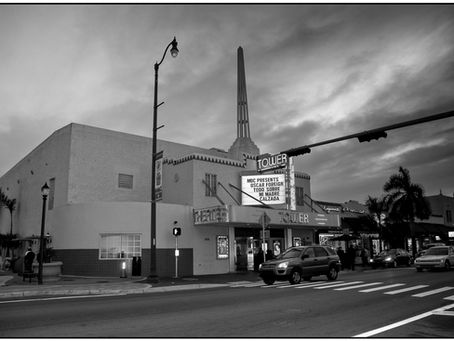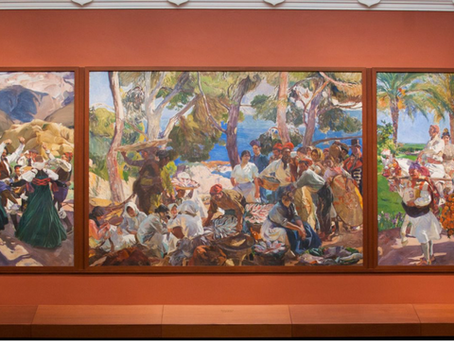top of page
Search


From Divine Light to Domestic Beauty: The Medieval Media Revolution That Changed Everything
In the 1880s, Louis Comfort Tiffany lokking at this 700-year-old tradition would asked: “What if we could bring this magic into people’s daily lives, and into their homes?” The question lead Tiffany to reimagined the medieval trinity for a new world.
7 hours ago5 min read


Sorolla: Following the Light
Perhaps, we have to stop swimming and let the current take us to safe harbor, or to a sandy beach somewhere. Come to think of it, it was in fact Aronovich who explained to me once how Weinschenk himself used to talk of shades of gray in film as beaches. And here I go again! drifting in free association when I should be getting ready to pick my daughter from school and talk about what we're going to do once we move to Madrid.
2 days ago3 min read


The Changing Landscape of Cultural Documentary Filmmaking
The next chapter in our nearly forty-year journey is being written now. If we are to continue thriving in this mission to ensure that art, culture, and social consciousness find their place in our rapidly evolving media landscape, we need a broader audience, international partnerships, and you.
3 days ago3 min read


Beyond Moral Absolutes: Cinema and Historical Memory in Latin America
While The Official Story reduces the experience of state terror to a moral fable with clear heroes and villains, I'm Still Here creates space for the ambiguous, bureaucratic horror that characterized the Brazilian military regime, ultimately providing a more profound engagement with historical memory.
5 days ago7 min read


A Tribute to Humberto Calzada
This is my tribute to Humberto Calzada: Cuban, American, painter, friend, brother in all the ways that matter. A man who understood that sometimes the only way to go home is to create it, brush stroke by brush stroke, until the canvas holds everything you remember about love.
6 days ago4 min read


Tiffany in the Wild: Capturing Louis Comfort Tiffany’s Living Art
In our digital age, when so much experience is mediated and virtual, these surviving in-context Tiffany works represent something increasingly rare: authentic encounters with artistic vision as it was originally intended. They exist in the wild not as abandoned artifacts but as continuing participants in American cultural life.
Aug 206 min read


MIPCOM ’25: Back in Cannes to Share Our New Films
I’m pleased to announce that I will be in Cannes from October 11 through 17 to represent the Heritage Film Project and share our most recent collection of films—created with your support and the generosity of cultural philanthropists dedicated to bringing the richness of American voices to the international stage.
Aug 141 min read


The Spanish Mark on New York: Five Artists Who Bridged Two Worlds
The lives of these four artists span different generations and movements, yet three share roots in Spain's Mediterranean arc—Valencia and Catalonia—while Vicente hails from Castile's high plains. Despite their distinct origins, these regions have long been Spain's most outward-looking, connected by trade, art, and a comfort with cultural exchange. Each man carried that sensibility to New York: an appreciation for light and color, a balance between classical training and natur
Aug 126 min read


Nathaniel Hawthorne’s Childhood
At the heart of that story stands Lucy Ann Sutton, cousin to Nathaniel Hawthorne. Her recollections, published in the New York Observer on August 4, 1887, constitute one of the few intimate, emotionally textured accounts of Hawthorne’s formative years.
Aug 85 min read


Julius John Lankes: Yankee Printmaker in Virginia
Throughout the film, Montes-Bradley weaves personal archival materials, interviews, and on-location filming with understated sensitivity. We see Lankes’s legacy not only through his prints but also through the memories of scholars, collectors, and descendants who help reconstruct the arc of his life—from Buffalo to Europe, from Vermont to Virginia.
Jul 233 min read


Moments That Never Make the Screen
here are moments during filming that never make it to the screen—far more of them than one might imagine. I’m not referring to bloopers, those lighthearted clips some reserve for the credits when all is said and done. I mean the other kind—the ones that stay with you, etched in memory.
Jul 221 min read


Bringing American Voices to Cannes
We’re proud to represent in Cannes a production model built on philanthropic collaboration and a commitment to making these stories freely available to students and the public through academic and public libraries.
Jul 142 min read


Now in Libraries Everywhere
We are proud to see 18 of our films streaming on Kanopy, a platform that brings thoughtful, independent storytelling to public and academic libraries across the U.S. and beyond. These titles—now available to students, educators, and the general public—represent over two decades of documentary work exploring history, music, race, art, exile, resistance, and identity.
Jul 11 min read


An Invitation to Watch Films: Explore Our Documentary Collection
Documentary Film Fund invites you to discover a curated selection of my documentary films, now available to stream for free with your public library card or university login at Kanopy.com
Jun 272 min read


The Case of George F. Bristow
Artificial intelligence, used responsibly, becomes not a shortcut but a legitimate creative tool. And there is historical precedent for this kind of intervention.
Jun 123 min read


Celebrating the Artistic Vision of Eduardo Galliani
I want to take a moment to shine a spotlight on the incredible work of my talented friend, Eduardo Galliani, particularly his contributions to the world of Book Arts and Publishing through Antares Portfolio.
Jun 92 min read


How Documentaries Illuminate Art
Documentaries can serve as cinematic expressions that explore social practices, traditions, and the shared experiences of specific groups.
Jun 94 min read


Memories of the Holocaust
What happened next remains uncertain. One version says that relatives and their daughters dug their graves before getting shot—buried in a mass grave still waiting to be discovered. Another account suggests they were deported to Treblinka and never returned. Either way, this photograph is the last image of the great-aunts I never had the chance to meet.
Jun 52 min read


Joe Erdman: Steward for the Arts
Last night’s tribute was more than fitting. It was a reminder that the arts don’t flourish without stewards—those who believe, quietly and persistently, in the transformative power of culture and community. Joe Erdman is one of them. And we’re all the better for it.
May 292 min read


Beyond the Canon: Diversity in 19th-Century American Classical Music
When I first started researching George Frederick Bristow, I expected the usual: a 19th-century American composer influenced mostly by European traditions. And sure enough, Bristow fits that mold—born in Brooklyn in 1825, the son of an English-born violinist, passionate about creating a national musical identity.
May 282 min read
bottom of page